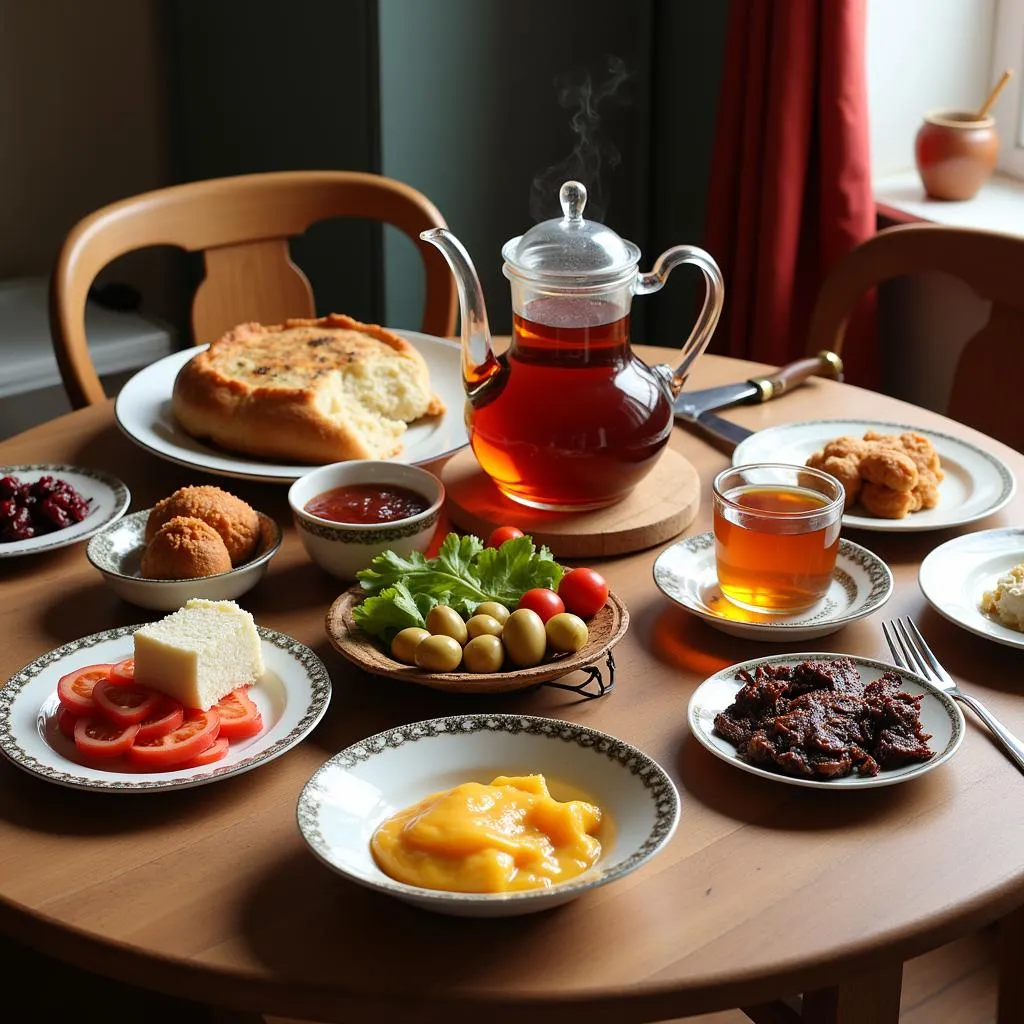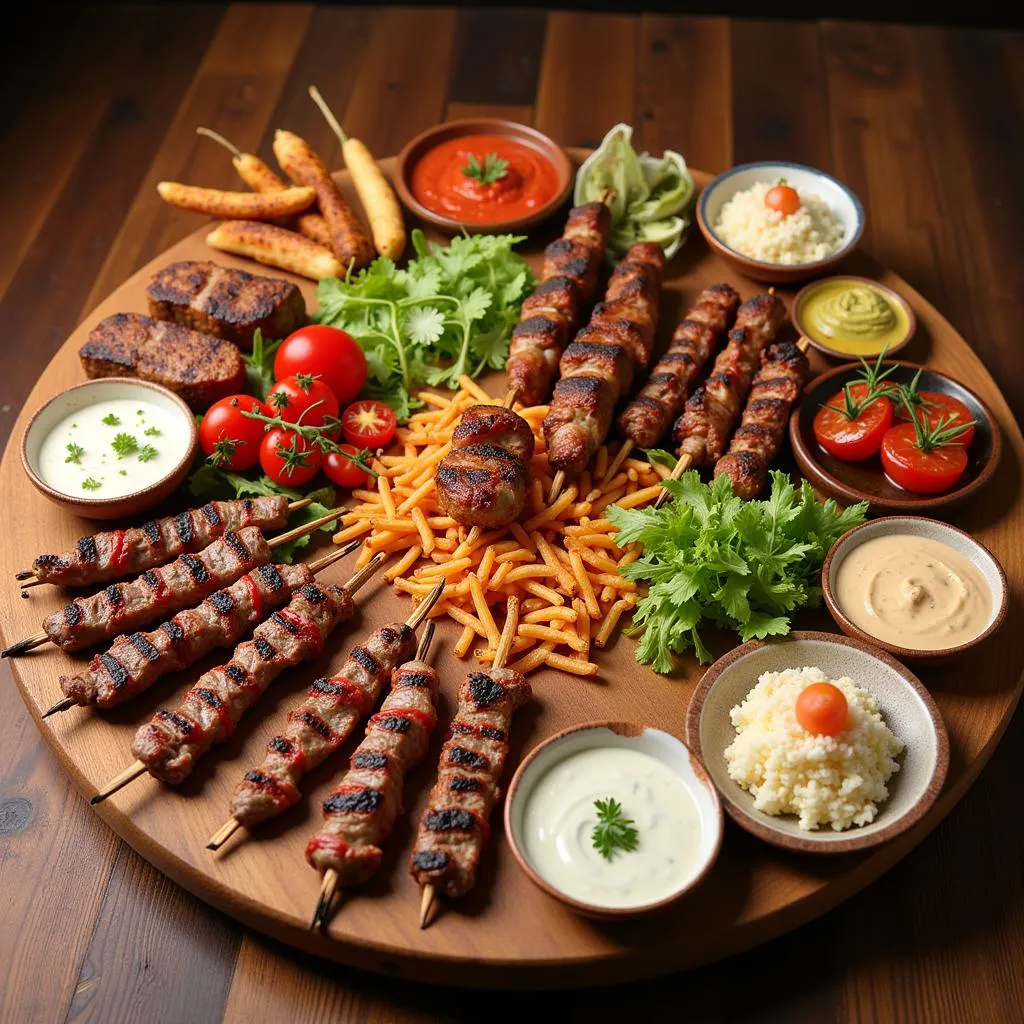Turkish food is more than just a meal – it’s an experience. A vibrant tapestry of flavors, aromas, and textures, Turkish cuisine will tantalize your taste buds and leave you craving more. From the bustling streets of Istanbul to the sun-kissed shores of the Aegean, a culinary adventure awaits, promising to redefine your perception of “delicious.”
A Celebration of Freshness and Flavor
At the heart of Turkish food lies a deep respect for fresh, seasonal ingredients. Imagine succulent tomatoes bursting with flavor, crisp cucumbers plucked straight from the vine, and juicy pomegranates adding bursts of sweetness to every bite.
 A colorful and diverse Turkish breakfast spread
A colorful and diverse Turkish breakfast spread
The emphasis on freshness is evident in the abundance of salads, vegetable dishes, and mezes (small plates meant for sharing) that grace every Turkish table. Each ingredient shines, its natural flavors enhanced by a delicate balance of herbs and spices.
A Symphony of Spices: The Soul of Turkish Cuisine
Turkish food is a masterclass in the art of spice blending. Forget bland and boring – Turkish cuisine explodes with aromatic complexity. Fragrant cumin, earthy turmeric, fiery red pepper flakes, and pungent sumac are just a few of the stars in this culinary constellation.
But it’s not just about heat – Turkish spices are used with a deft hand, adding depth, warmth, and intrigue to every dish. The result is a symphony of flavors that dance on your palate, leaving you wanting more.
Beyond the Kebab: Exploring the Diversity of Turkish Food
While the döner kebab may be Turkey’s most famous culinary export, it’s just the tip of the iceberg when it comes to the country’s rich culinary heritage.
 A platter of various Turkish dishes
A platter of various Turkish dishes
Venture beyond the familiar and discover a world of culinary treasures:
- Manti: Tiny, hand-folded dumplings filled with savory meat or lentil fillings, often served with a tangy yogurt sauce.
- Lahmacun: Thin, crispy dough topped with minced meat, vegetables, and herbs, often referred to as “Turkish pizza.”
- Pide: A boat-shaped flatbread, similar to pizza, baked with various toppings like cheese, minced meat, or spinach.
- Baklava: Layers of flaky filo pastry, filled with chopped nuts and sweetened with honey or syrup, a sweet treat that’s sure to satisfy.
Turkish Food: A Feast for the Senses
Dining in Turkey is about more than just the food – it’s an immersive cultural experience. The aroma of freshly baked bread wafts through the air, enticing you to step inside bustling restaurants. The vibrant colors of spices and fresh produce are a feast for the eyes.
 A cup of Turkish coffee and Turkish delight
A cup of Turkish coffee and Turkish delight
And then there’s the warm Turkish hospitality, making you feel like a welcome guest at every meal. Sharing food is an integral part of Turkish culture – from the bustling meyhanes (taverns) to the family dinner tables, be prepared for a generous and heartwarming experience.
Why Turkish Food is Simply the Best
Turkish food is more than just a meal – it’s a celebration of fresh ingredients, aromatic spices, and centuries-old culinary traditions. It’s a sensory journey that will captivate your taste buds, warm your heart, and leave you with lasting memories.
So, whether you’re a seasoned foodie or simply looking for an unforgettable culinary adventure, Turkish food is a must-try.
FAQs
1. What are some vegetarian-friendly options in Turkish cuisine?
Turkish cuisine offers a wide variety of vegetarian dishes. Look for options like “Mercimek Çorbası” (lentil soup), “Sebzeli Pide” (vegetable pide), “İmam Bayıldı” (stuffed eggplant), and “Zeytinyağlılar” (olive oil-based vegetable dishes).
2. What is the best way to experience Turkish coffee?
Turkish coffee is traditionally served in small cups. Take your time to savor the strong, aromatic brew. It’s customary to allow the coffee grounds to settle at the bottom of the cup before enjoying.
3. What is the significance of tea in Turkish culture?
Tea plays a central role in Turkish culture. It’s offered as a gesture of hospitality throughout the day and is an essential part of social gatherings.
4. Where can I find authentic Turkish food outside of Turkey?
Major cities worldwide often have Turkish restaurants or communities. Look for restaurants that use fresh ingredients, traditional cooking methods, and offer a variety of dishes beyond just kebabs.
5. What are some common Turkish desserts?
Besides baklava, Turkish cuisine boasts a wide array of desserts. Some popular options include “Künefe” (shredded pastry with cheese and syrup), “Sütlaç” (rice pudding), and “Lokma” (fried dough balls soaked in syrup).
Need assistance? Contact us 24/7 at Phone Number: 02437655121, Email: [email protected]. Or visit our address: 3PGH+8R9, ĐT70A, Trung Village, Bac Tu Liem, Hanoi, Vietnam. Our dedicated customer support team is here to help.